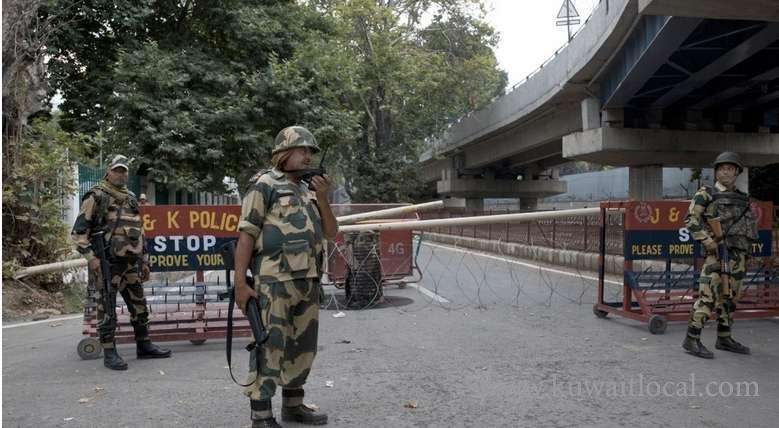Latest News
- Court Sentences Bank Employee To 5 Years For Embezzling 100,000...
- Fake ‘Sheikh’ Sentenced To 2-yr As Court Overturns Verdict
- Justice Ministry New Service On The Sahel App
- Ministry Probes 68 Cases Of Illegal Charity, Funds Collection
- Globally, Kuwait Is Among The Top Consumers Of Incense And Oud O...
- Decrease Seen In Foreign Investment
- Kuwait Customs Seized 2 Containers Laden With Tobacco At Shuwaik...
- Unpaid Salaries, Accountant Beaten Up By Workers
- The Sahel App Was Not Hacked, A Spokesman Claims
- Four Expats Arrested For Stealing Copper Cables Worth 60,000 Din...
- Indian National Died In Abdalli Car Accident
- Work Permits And Foreign Worker Transfers Are Amended By PAM
India Imposes Kashmir Clampdown To Head Off Eid Protests

Indian troops clamped tight restrictions on mosques across Kashmir for Monday's Eid Al Adha festival, fearing anti-government protests, according to residents.
The Himalayan region's biggest mosque, the Jama Masjid, was ordered closed and people were only allowed to pray in smaller local mosques so that no big crowds could gather, witnesses said.
Kashmir has been in a security lockdown for eight days as the government in New Delhi seeks to snuff out opposition to its move to impose tighter central control over the region.
Internet and phone communications have been cut and tens of thousands of troop reinforcements have flooded the main city of Srinagar and other Kashmir Valley towns and villages.
Authorities had eased restrictions temporarily on Sunday to let residents buy food and supplies for Eid, one of the most important festivals of the year.
But security was tightened again after sporadic protests involving hundreds of people during the day, residents said. Police vans toured the streets late Sunday telling people to stay indoors.
Residents said the security crackdown had made them too fearful to celebrate.
The decision by New Delhi has also sparked fury in Pakistan, with Prime Minister Imran Khan asking earlier Sunday if the international community was just standing by as Indian Hindu nationalism spread into Kashmir.
Khan tweeted on Sunday that the "ideology of Hindu Supremacy, like the Nazi Aryan Supremacy, will not stop" in Kashmir.
Describing the move he said it would lead to "the suppression of Muslims in India & eventually lead to targeting of Pakistan".
Islamabad has already expelled the Indian ambassador, halted what little bilateral trade exists and suspended cross-border transport services following New Delhi's move on Kashmir.
Spokesman Rajesh Bajpai said on Sunday Indian Railways had suspended its cross-border train service following Pakistan's moves.
Indian premier Modi insisted last week the decision to strip Kashmir of its autonomy was necessary for its economic development, and also to stop "terrorism".
Under its previous constitutional autonomy, Kashmiris enjoyed special privileges such as the sole right to own land or take government jobs and university scholarships.
With Kashmir now fully part of the Indian union, Modi said the region would enjoy more jobs and less corruption and red tape, adding that key infrastructure projects would be expedited.
SOURCE : KHALEEJTIMES
Trending News
-
 Eid Al Fitr 2024: Crescent Moon Not Sighted In Sau...
08 April 2024
Eid Al Fitr 2024: Crescent Moon Not Sighted In Sau...
08 April 2024 -
 Kuwait Implements Home Biometrics Services Ahead O...
14 April 2024
Kuwait Implements Home Biometrics Services Ahead O...
14 April 2024 -
 When Will Eid Al Fitr 2024 Take Place In Qatar, Ba...
08 April 2024
When Will Eid Al Fitr 2024 Take Place In Qatar, Ba...
08 April 2024 -
 On Sunday, The Meteorological Department Warns Of...
07 April 2024
On Sunday, The Meteorological Department Warns Of...
07 April 2024 -
 Kuwait Airways Provides Update On Flight Schedule...
14 April 2024
Kuwait Airways Provides Update On Flight Schedule...
14 April 2024 -
 Kuwait Airways Introduces Convenient Home Luggage...
15 April 2024
Kuwait Airways Introduces Convenient Home Luggage...
15 April 2024 -
 Gathering For Eid Al-Fitr Prayers: Kuwaiti Citizen...
10 April 2024
Gathering For Eid Al-Fitr Prayers: Kuwaiti Citizen...
10 April 2024 -
 Winners Of Kuwait National Assembly 2024 Elections
06 April 2024
Winners Of Kuwait National Assembly 2024 Elections
06 April 2024 -
 An Egyptian Expat Dies At Kuwait's Airport
11 April 2024
An Egyptian Expat Dies At Kuwait's Airport
11 April 2024 -
 Bay Zero Water Park Kuwait: Summer Season Opens Ei...
11 April 2024
Bay Zero Water Park Kuwait: Summer Season Opens Ei...
11 April 2024











Comments Post Comment